What to do if the leaves of cucumbers turn yellow in a greenhouse and how to prevent it
A change in the color of leaf blades on garden crops is a signal about the unfavorable condition of the plants. The harvest may be at risk and the plant may die.
We'll tell you what to do if the leaves of cucumbers in a greenhouse turn yellow, and how to avoid this problem.
Reasons for yellowing of leaves in greenhouse cucumbers
Novice gardeners often make mistakes in caring for plants.. Inaccuracies in agricultural technology lead to changes in the color of crop leaves.
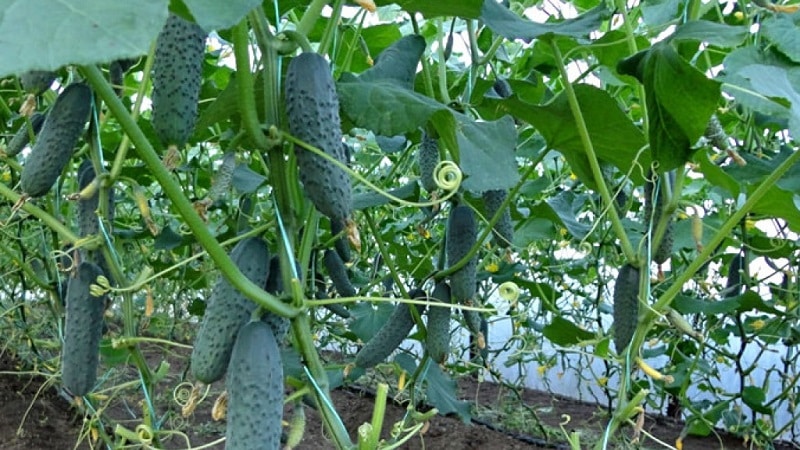
Mistakes when watering
Improper watering leads to leaf wilting and requires urgent adjustment:
- Dry soil in a greenhouse is the most common cause of wilting and yellowing of leaves. The optimal percentage of soil moisture for cucumbers is within 75-85%, that is, a lump of earth in your hands should not disintegrate when squeezed.
- Insufficient depth of moisture. With scanty watering, the root system does not develop deeper, which leads to disturbances in the plant’s nutrition and yellowing of the lower leaves.
- Yellowing of cucumber leaves may be a reaction to under or over watering. When the water content in the soil is high, especially in combination with cold weather, the roots of the plant begin to rot.
- Watering with cold water. Comfortable water temperature for humidification is +18…+25°С.
- Irrigation by leaves in sunny weather. Avoid getting water on the leaf blade, as drops become lenses leading to tissue necrosis.
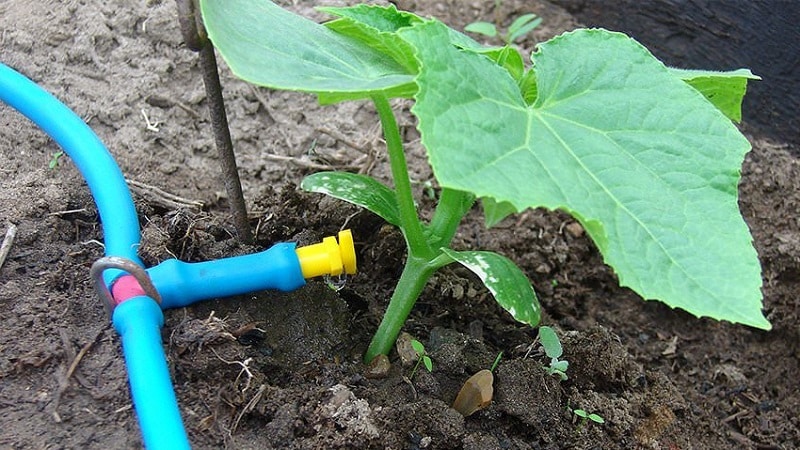
Temperature changes
Cucumbers are heat-loving. For their growth and development, air heated to +20…+24°C during the day and +16…+18°C at night.
Important! A temperature difference of more than 6°C is a severe stress for plants, to which they respond by yellowing of the leaves.
A sharp decrease in soil temperature to +13…+15°C - critical point: growth stops, the lashes turn yellow.
Fertilizer shortage
Fertilizers replenish nutrient deficiencies in the soil. The lack of elements necessary for cucumbers is manifested by the following symptoms::
- Nitrogen. The lack of a microelement affects the development of the entire plant as a whole: first, the veins lighten, then the leaves become faded green, turn yellow, become smaller, and the lashes become thinner. First of all, nitrogen starvation appears on older leaves. Often, nitrogen deficiency in a greenhouse occurs when planting cucumbers after tomatoes.
- Phosphorus affects the yellowing of leaves indirectly: its deficiency leads to poor absorption of nitrogen by the root system.
- Potassium maintains water balance, improves cold resistance and disease resistance. Its deficiency manifests itself as follows: initial yellowing of the edge of the leaf, its browning and death, while the veins seem to be pressed inward.
- Calcium. With its deficiency, white spots are observed along the edges and between the veins of the leaves, then only the main veins remain green.
- Magnesium. On older leaves, yellow spots (chlorosis) appear between the veins.
- Iron necessary for plants to form chlorophyll. The deficiency is manifested by a combination of yellow spots with bright green streaks.
- Copper. Its deficiency is indicated by yellowing of young leaves.
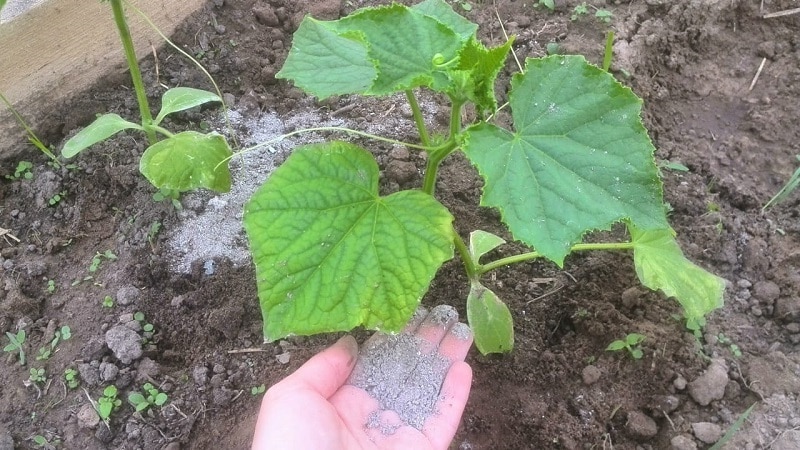
Insufficient lighting
If the plantings are dense or the cucumber bush is not properly formed on a trellis in the greenhouse, the lower leaves do not receive enough light, which leads to their yellowing and death.
Diseases
Diseases dangerous to cucumbers:
- Root rot. One of the most common causes of yellowing is the result of significant temperature changes between day and night.
- For bacteriosis of cucumbers (or angular spotting) small yellow spots appear on the cotyledons, then they turn brown and begin to get wet, which leads to necrosis.
- Downy mildew (downy mildew). With this fungal disease, individual small yellow spots of an acute-angled shape with clearly defined edges appear in the interveinal space on the front side of the leaf. Over time, they turn brown and the edges of the leaves curl upward.
- Anthracnose. Affects all parts of the plant. Browning and drying of the leaves is preceded by the appearance of small yellowish-green spots, gradually increasing in size and merging with each other. Then holes form in these places.
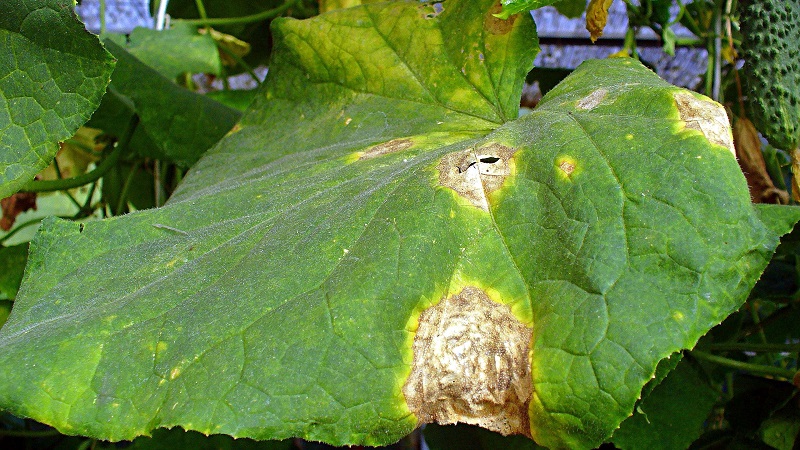
Pests
Pests that attack cucumbers in a greenhouse:
- Aphid settles on the underside of leaves and sucks juices from plants.
- Yellow, wilting leaves with cobwebs signal the need to check the plants for spider mite. In the dry air of greenhouses in the absence of ultraviolet light, the insect quickly multiplies on cucumbers. If you don't fight it, the whip will soon die.
Plant aging
Yellowing of the lower leaves on the plant towards the end of summer - the natural state of its vegetative developmentwhen the plant's life cycle comes to an end.
Is this dangerous for the crop?
Leaves for any plant are a source of respiration and energy; the processes of photosynthesis and metabolism occur in them. If the leaf apparatus is significantly damaged, the plant cannot fully develop and give a good harvest.
What to do
The task of any gardener is to find methods to prevent yellowing and death of the plant and preserve the harvest.
Fertilizers
The choice of fertilizers depends on the deficiency of minerals in the soil. But an inexperienced summer resident may incorrectly determine what kind of fertilizer and in what quantity cucumbers need. An overdose can worsen the situation.
Advice. Apply fertilizer to two or three bushes. If after four days the situation changes for the better, it means that the fertilizer and the proportions of its dilution were chosen correctly. You can start feeding the remaining plants.
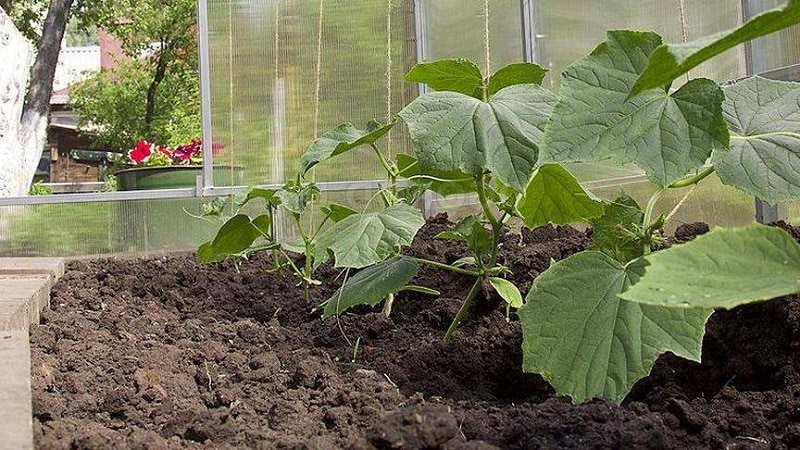
Recommendations for fertilizing:
- the lack of nitrogen is compensated by fertilizing with manure (in a ratio of 1:10), grass fertilizer (1:5), urea or ammonium nitrate (2 tablespoons per 10 liters of water);
- if necessary, add phosphorus to the soil, use “Superphosphate” (3 tablespoons per 10 liters of water);
- Potassium deficiency is compensated for with chlorine-free potassium fertilizer (3 tablespoons per 10 liters of water) or a solution of wood ash (500 g per 10 liters of water);
- if there is a lack of magnesium, dolomite is diluted (1 glass per 10 liters of water);
- the need for copper, iron, and zinc is replenished with chelated forms of these microelements.
Chemicals
When cucumbers are infected with fungal or bacterial diseases, often settling in greenhouses, cannot be avoided without treatment with chemicals.
Attention! Consider the time interval required for the drug to be removed from the plant. The possible period after treatment before harvest can range from 3 to 30 days.
The following fungicides are used against fungal diseases of cucumbers: Previkur, Ridomil, Topaz, Bravo, Oksikhom, Avixilom and others.
Often the recommended Bordeaux mixture is used only for preventive purposes.
Broad-spectrum insecticides work against aphids: “Inta-Vir”, “Aktara”, “Konfidor”, “Fitoverm”, “Fufanon”.
Acaricides will help get rid of spider mites (“Akarin”, “Agravertin”, “Floromite”) and less dangerous biological preparations: “Vertimek”, “Kleschevit”, “Fitoverm”.
It is important to observe the frequency of application of drugs to avoid disease/pest resistance to the drug.
Traditional methods
How is an antifungal agent used? baking soda solution (1 tbsp per 1 bucket of water).
Disinfecting and nutritional mixtures:
- based on milk or kefir (1 liter per 10 liters of water) with the addition of 40 drops of iodine;
- infusion of onion peel;
- infusion of bread and iodine.
Cucumbers are sprayed with infusion against insects tobacco, celandine or horse sorrel, hot pepper with soapy water.
Agrotechnical techniques
The easiest way to eliminate the causes of yellowing cucumber leaves is if they were the result of improper plant care:
- Proper watering - irrigation in the morning or evening 3-4 times a week with water +20...+25°C. Drying of the top layer of soil to a depth of 3-4 cm signals the need for urgent watering.
- Using mulch, which will retain moisture and heat in the soil and provide additional nutrition to the plants.
- During cold weather, it is recommended to close the greenhouse doors, and in hot weather, ventilate the structure (this will prevent condensation from accumulating).
- Trimming overgrown cucumber vines to improve lighting.
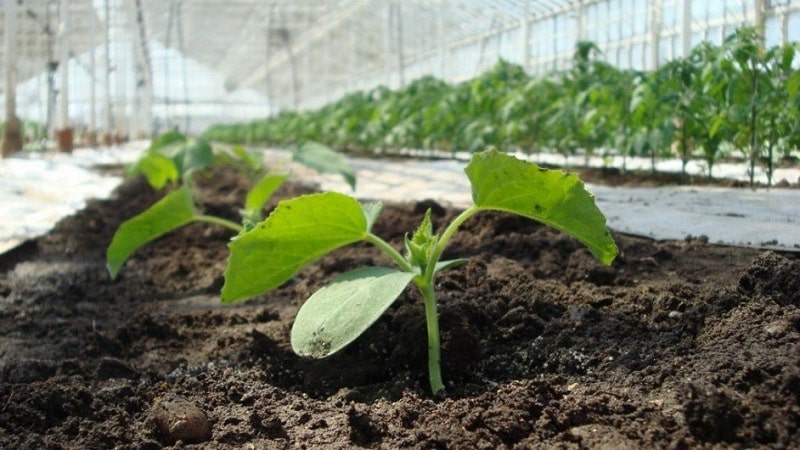
Prevention measures
To prevent the problem of yellowing and wilting of leaves for cucumbers in a greenhouse, follow these tips:
- Maintain crop rotation. It is not recommended to plant cucumbers after pumpkin ones or for several years in a row in one place.
- Treat the walls of greenhouses and soil with disinfectants and antifungal agents.
- Choose cucumber varieties that are resistant to pests and diseases that have occurred on your plot of land.
- Disinfect seeds before planting.
- Organize a drip irrigation system.
- Apply organic or mineral fertilizers to the soil when digging.
- During the growing season, carry out mandatory fertilizing.
- For optimal growth conditions for cucumber vines and ease of care for them, observe the density of planting of seedlings.
Tips and reviews from experienced gardeners
Summer residents share their experience of dealing with yellowing of leaves on cucumbers.
Vera, Pavlovsk: “In past years I used different methods. I settled on iodine, whey, and herbal infusion. I do not loosen the soil around the roots within a radius of 10 cm, and in the second half of the season I only add soil to the roots once a week after the next watering. Always with the harvest!
Tatiana, s. Red: “The weather this year in summer is terrible. You can place a large dark barrel of water inside the greenhouse. It collects heat from the sun during the day and warms the air at night. I heard this advice from a neighbor. I asked my husband, he brought me two iron cans. I placed it at the entrance and exit of the greenhouse. The cucumbers stopped turning yellow and began to grow".
Elena, Orsk: “Last year my cucumbers almost died because of spider mites. Suddenly the leaves began to turn yellow and then dry out. I noticed that there was a cobweb on the leaf and some movement there. I read about Fitoverm and decided that I could try spraying it, considering that the greens could be picked in just three days.The tick disappeared immediately, I didn’t even wait for the second treatment.”.
Conclusion
Initially, it is important to determine the cause of yellowing of leaves on cucumbers in a greenhouse and then act accordingly. This is the use of fertilizers to replenish missing microelements, chemical or traditional methods of combating diseases and insects, and the use of agricultural techniques to create favorable conditions for the growth of cucumbers.